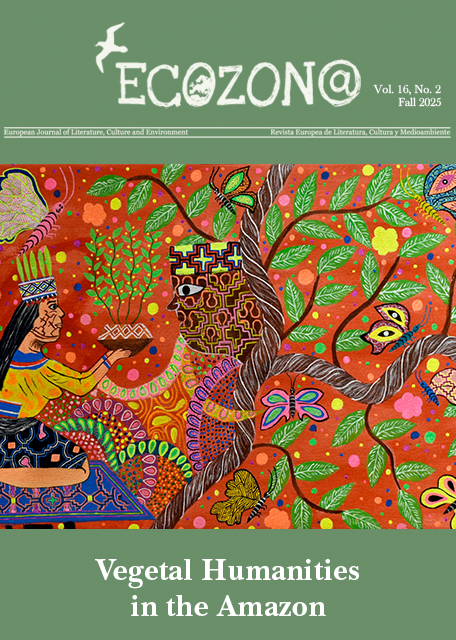<b>Digital Games about the Materiality of Digital Games</b> // Juegos digitales sobre la materialidad de los juegos digitales
DOI:
https://doi.org/10.37536/ECOZONA.2017.8.2.1347Schlagworte:
Digital games, materiality, responsibility, dwelling, fun // Juegos digitales, materialidad, responsabilidad, morada, diversiónAbstract
This article investigates the potential for digital games to advance environmentally responsible attitudes by attending to their own material conditions, since the production, consumption, and disposal of games and the platforms on which they run enact ecological harm. I examine how Tomorrow Corporation’s puzzle game Little Inferno (2012) and Molleindustria’s political mobile game Phone Story (2011) address their own participation in ecological harm through rendering visible the very games themselves being played as material commodities. In doing so, they acknowledge their own complicity as well as that of their players in existing processes of environmental degradation. Moreover, both games challenge conventional expectations of fun as harmless or inconsequential, since this environmental destruction results from digital entertainment. I argue that digital games advancing environmentally responsible attitudes must address the ecological devastation tied to their materiality as well as support players in accepting responsibility for and remedying the harm players enact. Consequently, digital games of environmental responsibility must also question the dominant mode of fun that drives ecological devastation by reminding us that we dwell in a world where we need to be responsible for the fun we choose to have.
Resumen
Este artículo investiga el potencial de los juegos digitales para fomentar actitudes responsables hacia el medioambiente atendiendo a sus propias condiciones materiales, ya que la producción, el consumo, y el desecho de los juegos y de las plataformas en las que funcionan representan daño ecológico. Examino cómo el puzle Little Inferno (2012) de Tomorrow Corporation y el juego político para móvil Phone Story (2011) de Molleindustria abordan su propia participación en el daño ecológico haciendo visible el que los juegos en sí mismos sean productos materiales. Al hacerlo, reconocen su propia complicidad, así como la de los jugadores en los procesos de degradación medioambiental. Además, ambos juegos desafían las expectativas convencionales de la diversión como algo inofensivo e intrascendente, ya que esta destrucción medioambiental resulta del entretenimiento digital. Argumento que los juegos digitales que promueven actitudes responsables hacia el medioambiente deben abordar la devastación ecológica vinculada a su materialidad, así como animar a los jugadores a que acepten su responsabilidad y corrijan el daño que hacen. En consecuencia, los juegos digitales con responsabilidad medioambiental deben también cuestionar la forma dominante de diversión que conlleva devastación ecológica recordándonos que vivimos en un mundo en el que necesitamos ser responsables de la diversión que elegimos tener.
Downloads
Downloads
Zusätzliche Dateien
Veröffentlicht
Ausgabe
Rubrik
Lizenz
Authors who publish with this journal agree to the following terms:
a) Authors retain copyright and grant the journal right of first publication with the work simultaneously licensed under a Creative Commons Attribution License that allows others to share the work with an acknowledgement of the work's authorship and initial publication in this journal (CC BY-NC for articles and CC BY-NC-ND for creative work, unless author requests otherwise.
b) Authors are able to enter into separate, additional contractual arrangements for the non-exclusive distribution of the journal's published version of the work (e.g., post it to an institutional repository or publish it in a book), with an acknowledgement of its initial publication in this journal.
c) Authors are permitted and encouraged to post their work online (e.g., in institutional repositories or on their website) prior to and during the submission process, as it can lead to productive exchanges, as well as earlier and greater citation of published work (See The Effect of Open Access).










